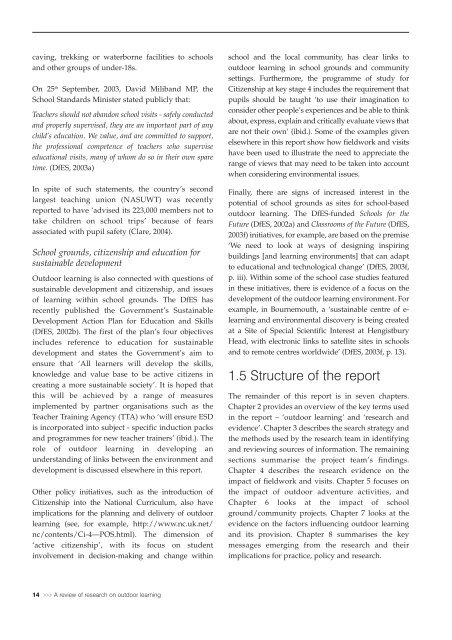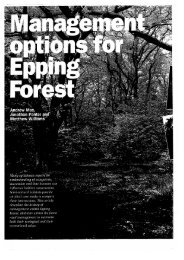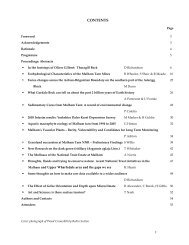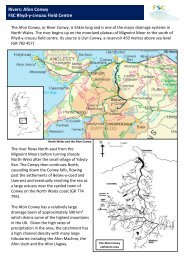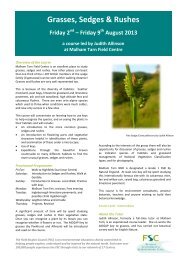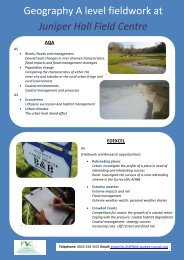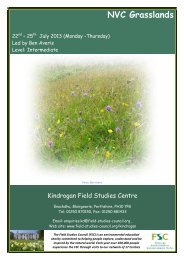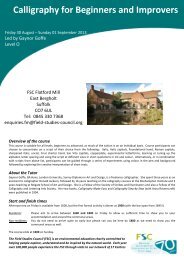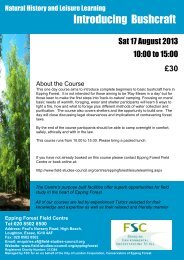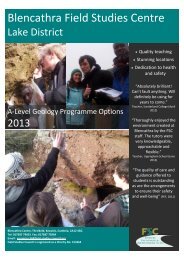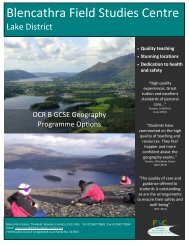A review of research on outdoor learning - Field Studies Council
A review of research on outdoor learning - Field Studies Council
A review of research on outdoor learning - Field Studies Council
- No tags were found...
Create successful ePaper yourself
Turn your PDF publications into a flip-book with our unique Google optimized e-Paper software.
caving, trekking or waterborne facilities to schoolsand other groups <str<strong>on</strong>g>of</str<strong>on</strong>g> under-18s.On 25 th September, 2003, David Miliband MP, theSchool Standards Minister stated publicly that:Teachers should not aband<strong>on</strong> school visits - safely c<strong>on</strong>ductedand properly supervised, they are an important part <str<strong>on</strong>g>of</str<strong>on</strong>g> anychild’s educati<strong>on</strong>. We value, and are committed to support,the pr<str<strong>on</strong>g>of</str<strong>on</strong>g>essi<strong>on</strong>al competence <str<strong>on</strong>g>of</str<strong>on</strong>g> teachers who superviseeducati<strong>on</strong>al visits, many <str<strong>on</strong>g>of</str<strong>on</strong>g> whom do so in their own sparetime. (DfES, 2003a)In spite <str<strong>on</strong>g>of</str<strong>on</strong>g> such statements, the country’s sec<strong>on</strong>dlargest teaching uni<strong>on</strong> (NASUWT) was recentlyreported to have ‘advised its 223,000 members not totake children <strong>on</strong> school trips’ because <str<strong>on</strong>g>of</str<strong>on</strong>g> fearsassociated with pupil safety (Clare, 2004).School grounds, citizenship and educati<strong>on</strong> forsustainable developmentOutdoor <strong>learning</strong> is also c<strong>on</strong>nected with questi<strong>on</strong>s <str<strong>on</strong>g>of</str<strong>on</strong>g>sustainable development and citizenship, and issues<str<strong>on</strong>g>of</str<strong>on</strong>g> <strong>learning</strong> within school grounds. The DfES hasrecently published the Government’s SustainableDevelopment Acti<strong>on</strong> Plan for Educati<strong>on</strong> and Skills(DfES, 2002b). The first <str<strong>on</strong>g>of</str<strong>on</strong>g> the plan’s four objectivesincludes reference to educati<strong>on</strong> for sustainabledevelopment and states the Government’s aim toensure that ‘All learners will develop the skills,knowledge and value base to be active citizens increating a more sustainable society’. It is hoped thatthis will be achieved by a range <str<strong>on</strong>g>of</str<strong>on</strong>g> measuresimplemented by partner organisati<strong>on</strong>s such as theTeacher Training Agency (TTA) who ‘will ensure ESDis incorporated into subject - specific inducti<strong>on</strong> packsand programmes for new teacher trainers’ (ibid.). Therole <str<strong>on</strong>g>of</str<strong>on</strong>g> <strong>outdoor</strong> <strong>learning</strong> in developing anunderstanding <str<strong>on</strong>g>of</str<strong>on</strong>g> links between the envir<strong>on</strong>ment anddevelopment is discussed elsewhere in this report.Other policy initiatives, such as the introducti<strong>on</strong> <str<strong>on</strong>g>of</str<strong>on</strong>g>Citizenship into the Nati<strong>on</strong>al Curriculum, also haveimplicati<strong>on</strong>s for the planning and delivery <str<strong>on</strong>g>of</str<strong>on</strong>g> <strong>outdoor</strong><strong>learning</strong> (see, for example, http://www.nc.uk.net/nc/c<strong>on</strong>tents/Ci-4—POS.html). The dimensi<strong>on</strong> <str<strong>on</strong>g>of</str<strong>on</strong>g>‘active citizenship’, with its focus <strong>on</strong> studentinvolvement in decisi<strong>on</strong>-making and change withinschool and the local community, has clear links to<strong>outdoor</strong> <strong>learning</strong> in school grounds and communitysettings. Furthermore, the programme <str<strong>on</strong>g>of</str<strong>on</strong>g> study forCitizenship at key stage 4 includes the requirement thatpupils should be taught ‘to use their imaginati<strong>on</strong> toc<strong>on</strong>sider other people’s experiences and be able to thinkabout, express, explain and critically evaluate views thatare not their own’ (ibid.). Some <str<strong>on</strong>g>of</str<strong>on</strong>g> the examples givenelsewhere in this report show how fieldwork and visitshave been used to illustrate the need to appreciate therange <str<strong>on</strong>g>of</str<strong>on</strong>g> views that may need to be taken into accountwhen c<strong>on</strong>sidering envir<strong>on</strong>mental issues.Finally, there are signs <str<strong>on</strong>g>of</str<strong>on</strong>g> increased interest in thepotential <str<strong>on</strong>g>of</str<strong>on</strong>g> school grounds as sites for school-based<strong>outdoor</strong> <strong>learning</strong>. The DfES-funded Schools for theFuture (DfES, 2002a) and Classrooms <str<strong>on</strong>g>of</str<strong>on</strong>g> the Future (DfES,2003f) initiatives, for example, are based <strong>on</strong> the premise‘We need to look at ways <str<strong>on</strong>g>of</str<strong>on</strong>g> designing inspiringbuildings [and <strong>learning</strong> envir<strong>on</strong>ments] that can adaptto educati<strong>on</strong>al and technological change’ (DfES, 2003f,p. iii). Within some <str<strong>on</strong>g>of</str<strong>on</strong>g> the school case studies featuredin these initiatives, there is evidence <str<strong>on</strong>g>of</str<strong>on</strong>g> a focus <strong>on</strong> thedevelopment <str<strong>on</strong>g>of</str<strong>on</strong>g> the <strong>outdoor</strong> <strong>learning</strong> envir<strong>on</strong>ment. Forexample, in Bournemouth, a ‘sustainable centre <str<strong>on</strong>g>of</str<strong>on</strong>g> e-<strong>learning</strong> and envir<strong>on</strong>mental discovery is being createdat a Site <str<strong>on</strong>g>of</str<strong>on</strong>g> Special Scientific Interest at HengistburyHead, with electr<strong>on</strong>ic links to satellite sites in schoolsand to remote centres worldwide’ (DfES, 2003f, p. 13).1.5 Structure <str<strong>on</strong>g>of</str<strong>on</strong>g> the reportThe remainder <str<strong>on</strong>g>of</str<strong>on</strong>g> this report is in seven chapters.Chapter 2 provides an overview <str<strong>on</strong>g>of</str<strong>on</strong>g> the key terms usedin the report – ‘<strong>outdoor</strong> <strong>learning</strong>’ and ‘<str<strong>on</strong>g>research</str<strong>on</strong>g> andevidence’. Chapter 3 describes the search strategy andthe methods used by the <str<strong>on</strong>g>research</str<strong>on</strong>g> team in identifyingand <str<strong>on</strong>g>review</str<strong>on</strong>g>ing sources <str<strong>on</strong>g>of</str<strong>on</strong>g> informati<strong>on</strong>. The remainingsecti<strong>on</strong>s summarise the project team’s findings.Chapter 4 describes the <str<strong>on</strong>g>research</str<strong>on</strong>g> evidence <strong>on</strong> theimpact <str<strong>on</strong>g>of</str<strong>on</strong>g> fieldwork and visits. Chapter 5 focuses <strong>on</strong>the impact <str<strong>on</strong>g>of</str<strong>on</strong>g> <strong>outdoor</strong> adventure activities, andChapter 6 looks at the impact <str<strong>on</strong>g>of</str<strong>on</strong>g> schoolground/community projects. Chapter 7 looks at theevidence <strong>on</strong> the factors influencing <strong>outdoor</strong> <strong>learning</strong>and its provisi<strong>on</strong>. Chapter 8 summarises the keymessages emerging from the <str<strong>on</strong>g>research</str<strong>on</strong>g> and theirimplicati<strong>on</strong>s for practice, policy and <str<strong>on</strong>g>research</str<strong>on</strong>g>.14 >>> A <str<strong>on</strong>g>review</str<strong>on</strong>g> <str<strong>on</strong>g>of</str<strong>on</strong>g> <str<strong>on</strong>g>research</str<strong>on</strong>g> <strong>on</strong> <strong>outdoor</strong> <strong>learning</strong>


